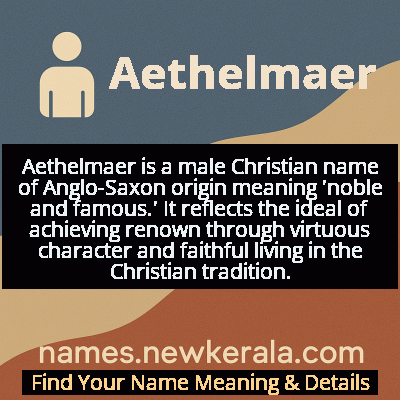Aethelmaer Name Meaning & Details
Origin, Popularity, Numerology Analysis & Name Meaning of Aethelmaer
Discover the origin, meaning, and cultural significance of the name AETHELMAER. Delve into its historical roots and explore the lasting impact it has had on communities and traditions.
Name
Aethelmaer
Gender
Male
Origin
Christian
Lucky Number
7
Meaning of the Name - Aethelmaer
Aethelmaer is a male Christian name of Anglo-Saxon origin meaning 'noble and famous.' It reflects the ideal of achieving renown through virtuous character and faithful living in the Christian tradition.
Aethelmaer - Complete Numerology Analysis
Your Numerology Number
Based on Pythagorean Numerology System
Ruling Planet
Neptune (Ketu)
Positive Nature
Intuitive, analytical, spiritual, and inquisitive.
Negative Traits
Secretive, reserved, aloof, and can be overly critical.
Lucky Colours
Green, yellow.
Lucky Days
Monday.
Lucky Stones
Cat’s eye, moonstone.
Harmony Numbers
1, 5, 6.
Best Suited Professions
Scientists, researchers, spiritual leaders, detectives.
What People Like About You
Depth of knowledge, analytical skills, spirituality.
Famous People Named Aethelmaer
Æthelmaer the Pious
Anglo-Saxon noble and monastic founder
Founded Eynsham Abbey and was a prominent patron of religious institutions during the reign of Æthelred the Unready
Æthelmaer of Elmham
Bishop
Served as Bishop of Elmham and played a key role in the Benedictine Reform movement in Anglo-Saxon England
Æthelmaer, Ealdorman of the Western Provinces
Anglo-Saxon noble and military leader
Served as ealdorman under King Cnut and was a major landowner recorded in the Domesday Book
Name Variations & International Equivalents
Click on blue names to explore their detailed meanings. Gray names with will be available soon.
Cultural & Historical Significance
The name's cultural significance extends beyond its historical usage to represent the enduring influence of Anglo-Saxon Christianity on English religious and cultural identity. As England transitioned from pagan Germanic traditions to Christianity, names like Aethelmaer embodied the integration of native cultural values with new religious ideals. The name appears in important historical documents such as the Anglo-Saxon Chronicle and Domesday Book, connecting it to key moments in English history. While its usage declined after the Norman Conquest introduced French naming conventions, Aethelmaer remains an important artifact of England's Christian heritage and continues to interest historians, genealogists, and those exploring early English Christian identity.
Extended Personality Analysis
Individuals named Aethelmaer are typically associated with a personality that combines traditional values with intellectual depth and moral strength. They often exhibit natural leadership qualities tempered by humility, reflecting the name's meaning of 'noble fame' – suggesting renown earned through virtuous character rather than self-promotion. These individuals tend to be thoughtful, principled, and deeply committed to their beliefs and responsibilities. They often possess a strong sense of history and tradition, finding meaning in continuity and legacy. Their approach to life is typically measured and deliberate, with decisions made after careful consideration rather than impulsive reaction.
In social settings, Aethelmaers are often perceived as reliable, dignified, and somewhat reserved, though they can be warm and engaging with those they trust. They value authenticity and tend to form deep, lasting relationships rather than numerous superficial ones. Professionally, they often excel in roles that require integrity, wisdom, and stewardship – such as education, religious leadership, historical preservation, or community service. Their strength lies in their ability to balance tradition with progress, honoring the past while thoughtfully engaging with the present. While they may sometimes be perceived as old-fashioned, their consistency and moral clarity often make them respected figures in their communities.
Modern Usage & Popularity
In contemporary naming practices, Aethelmaer is exceptionally rare and primarily appears in specific contexts rather than mainstream usage. The name is most commonly chosen by parents with strong interests in Anglo-Saxon history, medieval studies, or historical reenactment communities. It also sees occasional use among families seeking to honor specific Anglo-Saxon ancestry or maintain cultural heritage connections. The modern derivative 'Elmer,' which evolved from Aethelmaer through linguistic simplification, enjoyed moderate popularity in the late 19th and early 20th centuries but has since become uncommon. Today, Aethelmaer is typically selected by parents who prioritize historical significance and cultural meaning over current naming trends, often as part of a broader interest in reviving Old English names. Its usage remains confined to niche communities, with perhaps only a handful of children receiving this name annually in English-speaking countries.
Symbolic & Spiritual Meanings
Symbolically, Aethelmaer represents the ideal of virtuous nobility and enduring legacy within a Christian framework. The name embodies the concept that true greatness comes not from worldly power or wealth, but from moral character, spiritual depth, and service to others. It symbolizes the transformation of secular aristocratic values into Christian virtues – where 'nobility' becomes Christ-like humility and service, and 'fame' becomes recognition for godly living rather than earthly accomplishment. The name also carries symbolic weight as a bridge between England's pre-Christian Germanic heritage and its Christian identity, representing the successful integration of native cultural values with new religious ideals. In a broader sense, Aethelmaer symbolizes historical continuity, cultural preservation, and the enduring power of tradition to inform modern identity and values.

